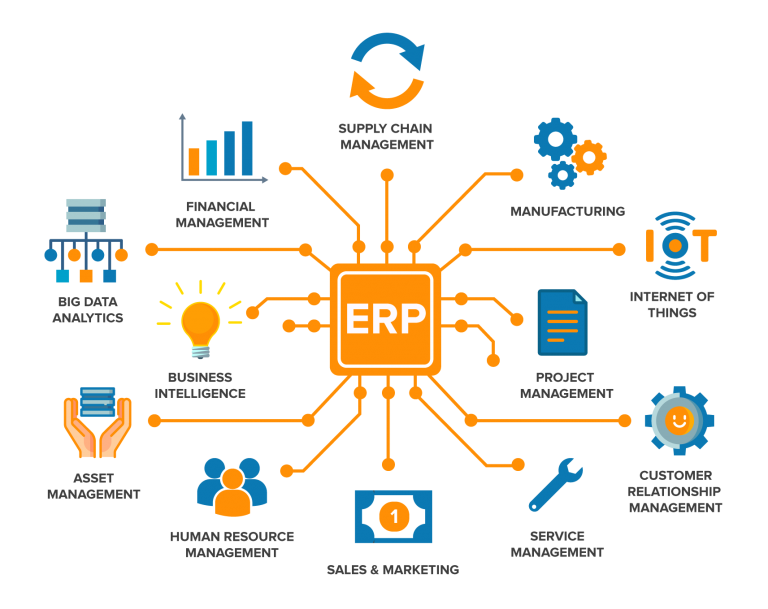Enterprise resource planning (ERP) is a software system that utilizes a centralized database that contains all the necessary data in one location.
The data is generated from the transactions produced by every business process enabled by the ERP system. This database is shared across multiple departments to support multiple functions.
The shared information allows for easy metric reporting and faster implementations of tasks, such as orders, marketing and bookkeeping. In essence, an ERP system automates processes across departments.
The Purpose of ERP Systems Then and Now
Originally, these types of systems were meant to automate certain manufacturing processes, in order to streamline common functions such as inventory management, order fulfillment, and order status.
Soon, more manufacturing processes were added, and ERPs became more versatile. Later on, ERP solutions spread beyond manufacturing to other industries.
Today, modern ERP systems often encompass all departments across a business, and include human resources, accounting, and even IT.
Not just for large manufacturing companies anymore, an ERP is now extremely relevant and useful for any type of business – including small to midsize ones – that has functions spanning multiple departments.
No More Business Silos That Block Progress
A good ERP can be very useful in lessening or even eliminating the tendency of departments to become “silos”, which are departments that often operate as separate, competitive units.
This type of isolation and competition is counterintuitive to a cohesive vision within a company and can cause a loss of productivity. Often a business can find it difficult to break up these isolated pockets within the company.
Using an ERP to automate tasks and share information can help prevent silos from occurring and also dissolve existing ones. Employees who can easily share information will be more likely to work together in a cooperative manner.
An ERP used effectively will promote singleness of purpose throughout the company and redirect everyone’s energy toward a common goal.
Automated Interactions Save Time and Money
The primary purpose of an ERP is to automate interactions across departments. The most obvious benefit of this automation is to better utilize an employee’s time during work hours.
Other results that are less obvious but just as beneficial are fewer runtime errors and less redundant data.
When employees have to spend time hunting down errors and correcting and consolidating duplicate data, time is wasted and money is lost. Eliminating these errors lets employees better direct their time.
With a shared repository of information, all processes are faster, and communication is improved across the board.
Speedy answers and immediate reports provide instant information that is always ready when needed.
Time saved from having to request reports from different departments is a direct benefit of automated reports that are integrated within one system and drawn from one centralized data repository.
The Beneficial Impact of AI within an ERP
Besides the automation an ERP provides for outside purposes, an ERP can also derive benefit itself from increased automation within the application.
New and emerging technologies are impacting ERPs in many significant ways.
Artificial intelligence (AI) is being applied in a myriad of ways to provide more tightly integrated automation in newer ERP systems.
AI can be used to analyze immense amounts of data to generate insights that can in turn support improved business decisions or spot emerging trends.
In addition, the increased use of AI for routine functions like stock reorders allows for employees to better spend their time on tasks that AI cannot easily do.
These same employees will also now have more time to expand their skill sets and training.
AI can determine how to route and execute transactions through the use of modern technologies such as inbound voice recognition (IVR).
When applied to an ERP system, IVR lets users operate within the application hands-free, which improves accuracy and operations for work activities.
Voice recognition interactions can also boost security when it is applied to user authentication and privileges.
The Internet of Things Expands the Reach of ERPs
Another interesting benefit of automation is the potential to interact with products directly within an ERP system.
The Internet of Things (IoT) refers to items that have embedded smart sensors that can interact through the internet.
An ERP that connects to these types of products can provide information and alerts on the status of said items.
Not only can this technology reduce maintenance and provide longer lifecycles, it can also provide any number of other benefits, including streamlining production runs, adding visibility to supply chains, and adding efficiency to purchasing operations.
An ERP system can even power down equipment and appliances when they are not needed to save energy and potentially extend the equipment’s service life.
The ability to determine cycles of use and then send signals to shut down is a tremendous asset.
Ultimately, the information collected about issues and actual usage is invaluable in respect to designing a better and more refined product.
When it comes to automation, the benefits such as improved efficiency, time savings, and reduced chances for error outweigh the costs of moving to a modern ERP.
A common perception is that automation replaces people.
This is not exactly true. While the employee may not be working on certain routine tasks anymore due to automation, the same employee can be redirected toward a more productive use of their time and effort.
ERPs have long been a great way to streamline functions within a company, and now, with the addition of evolving technology, today’s ERPs are an exciting tool for any company, large or small.
Promoted

